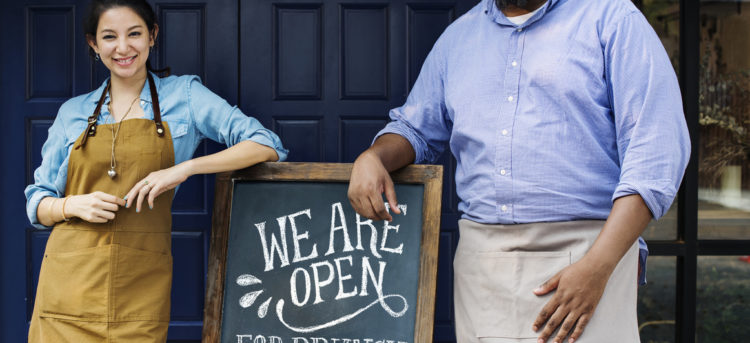Those that serve our country deserve to be supported both before, during, and after service. What if their dream is to start or grow a business? Fortunately, there are loans designed to do just that. While the majority of the opportunities provided to veterans are listed through the entrepreneur portal on the Veteran’s Administration (VA) website, they are actually managed by the Small Business Administration (SBA) – through the Office of Veteran’s Business Development (OVBD).
The SBA claims that “Veteran-owned businesses are one of the fastest-growing and significant segments of the U.S. economy.” Are you ready to join them? See what small business loans may be available to vets – along with tips for applying – in our guide below.
SBA 7(a) Loan
This loan isn’t specifically aimed toward vets, but it is the most popular and widely-used loan program through the SBA. If you’re looking for SBA loans for veterans, this is where you should start. Like most loans through the program, an SBA 7(a) loan requires applicants to be U.S.-based, meet size standards (the smaller, the better), operate for profit, and have something of their own equity or assets to invest or use for collateral. The SBA also likes to see that you’ve tried getting other kinds of funding or have used up your own personal financial resources before you apply.
Once approved for an SBA 7(a) loan, you can use it for a variety of business-related projects, including (but not limited to): buying land or property, making repairs, refinancing your debt, buying materials or equipment, growing your business operations through new hires or product launches.
While the business loans through the program are open to everyone who qualifies – not just vets – the perks are notable. Loan repayment terms are generally more gracious, allowing borrowers to take more time to pay and, ultimately, accepting lower payment amounts per month. Since banks offer unique terms to their specific loan product, the rates will vary; some banks offer fixed-rate and other only offer variable-rate.
Within the SBA 7, (a) loan program is several, more-specific loan products. Some are specifically-designed to serve underrepresented groups, such as vets. They include:
SBA Express – This program guarantees a 36-hour turnaround for applications for funds. Loans must not be over $350,000; loans under $25,000 may not require collateral. Revolving lines of credit are often offered through this program, for a term of up to seven year. (If you’ve heard of the Patriot Express Loan program for veterans, that closed several years ago. The SBA Express program is the closest thing to that program that we have.)
Export Express – If you are in the export business, you’ll need to apply for a loan specific to your needs. The Export Express loan offers funds of up to $500,000 for qualified applicants; decisions are made within 24 hours. Collateral requirements are similar to non-SBA loan programs. (Be prepared to have some!)
How Veteran’s Advantage Helps
While veteran-specific loans aren’t common, there is a distinct advantage to having veteran status when applying for most all of the widely-available SBA-backed loans. The Veteran’s Advantage program works to ensure that vets are fairly represented and given opportunities to start and grow businesses. Among the perks of the program are reduced fees for applying for loans, which can significantly lower the cost of taking out credit for those who qualify. To be eligible for the discount, the business must be at least “51 percent owned and controlled by someone in one of the following groups:
- Honorably discharged veterans
- Active Duty Military service member eligible for the military’s Transition Assistance Program (TAP)
- Service-disabled veterans
- Reservists and active National Guard members
- Current spouse of any veteran, active duty service member, Reservist, National Guard member, or the widowed spouse of a service member who died while in service or as a result of a service-connected disability.”
The lender is ultimately responsible for approving or denying an application, however. To keep status with the SBA, banks must meet qualifications. The only way to truly know what VA-focused loans are available is to go through the SBA lender match portal for small business lending. You won’t be given a list of VA program participants, but rather will be asked to fill out general information, and your info will then be passed along to the programs you are best-suited for (which will include VA programs, if applicable.)
Disaster Relief
One other way to get funding as a veteran is through what the SBA calls “disaster relief” programs. The Military Reservist Economic Injury Disaster Loan (MREIDL) is made specifically to military reservist business owners who get called into active duty and need help keeping their business afloat in the meantime. Like other SBA offerings, businesses are expected to look elsewhere for funding first and are only allowed to apply if they can fund their own recovery. If they are eligible for a loan or other business credit line – and it won’t cause undue hardship to pursue these – federal law requires vets to start there, first.
The funds through this program max out at $2 million and can be used for “ordinary and necessary operating expenses” that the military reservist can no longer meet because of deployment or active duty activities. If the business owner has business interruption insurance (many do), the insurance needs to pay out first before the loan program can step in and help. The 2 million dollar threshold may also be waived if the business employs a significant number of people; business failure would have a ripple effect on a community, for example. Money can be used to keep the business going, as usual, not to be used as a substitute for regular commercial debt or to expand the business.
Military reservists can apply once they get notice of their call-up, and they can file for up to one year after they are discharged or released from active duty. Collateral is required for large loans (over $50,000.) The interest rate is currently 4%, and repayment is usually up to 30 years. The SBA can change terms, however, and FED rates may affect the final APR for any loan.
The application process for this loan is a bit different since it’s through a disaster program. The SBA handles it, not the banks.
For those veteran’s (and their spouses) who are looking for business funding, remember that certain banks, credit unions, and community groups may have their own programs to help vets expand their companies. Inquire about local resources available to you, as well as reach out to your local Chamber of Commerce or Veteran’s group for details on what may be new and outside of the government’s jurisdiction.
Did you like this article? You might also like our articles on business loans for women and minority business loans.
This article was originally written on January 10, 2019 and updated on October 16, 2019.



Have at it! We'd love to hear from you and encourage a lively discussion among our users. Please help us keep our site clean and protect yourself. Refrain from posting overtly promotional content, and avoid disclosing personal information such as bank account or phone numbers.
Reviews Disclosure: The responses below are not provided or commissioned by the credit card, financing and service companies that appear on this site. Responses have not been reviewed, approved or otherwise endorsed by the credit card, financing and service companies and it is not their responsibility to ensure all posts and/or questions are answered.